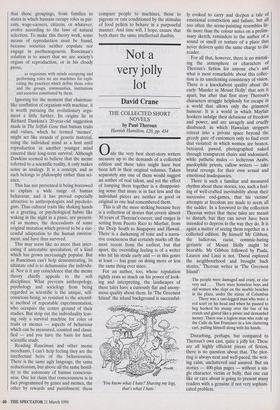Not a very jolly lot
David Crane
THE COLLEL 1 ED SHORT NOVELS by Paul Theroux Hamish Hamilton, £20, pp. 434 0 nly the very best short-story writers measure up to the demands of a collected edition and these tales might have best been left in their original volumes. Taken separately any one of them would suggest an author of real talent, and yet the effect of lumping them together is a disappoint- ing sense that more is in fact less and the individual pieces are neither as good or original as one had remembered them.
This is all the more striking because here is a collection of stories that covers almost 30 years of Theroux's career, and ranges in setting from Puerto Rico to Mayfair, from the Deep South to Singapore and Hawaii. There is a darkening of tone and a narra- tive conciseness that certainly marks off the most recent from the earliest, but that apart, the overriding feeling is of a writer who hit his stride early and — in this genre at least — has gone on doing more or less the same thing ever since.
For an author, too, whose reputation rightly rests so much on his power of look- ing and interpreting, the landscapes of these tales have a curiously flat and anony- mous quality about them. In 'The Greenest Island' the island background is successful- `You know what I hate? Shaving my legs, that's what I hate.' ly evoked to carry and deepen a tale of emotional constriction and failure, but all too often the scene-painting resembles lit- tle more than the colour notes on a prelim- inary sketch, reminders to the author of a sound or smell or texture of a place that never delivers quite the same charge to the reader.
For all that, however, there is no mistak- ing the atmosphere or characters of Theroux's fiction for anyone else's and what is most remarkable about this collec- tion is its unrelenting consistency of vision. There is a knockabout quality about the early 'Murder in Mount Holly' that sets it apart, but after that first story Theroux's characters struggle helplessly for escape in a world that allows only the grimmest humour. It is a world in which Mayfair hookers indulge their delusions of freedom and power, and are savagely and cruelly disabused; in which Hawaiian strippers retreat into a private space beyond the greedy gaze of customers only to find even that violated: in which women are beaten, betrayed, pawed, photographed naked through transparent chairs and sodomised, while pathetic males — lecherous Arabs, paedophile priests, callow writers — take brutal revenge for their own sexual and emotional inadequacies.
There is such a familiar and measured rhythm about these stories, too, such a feel- ing of well-crafted inevitability about their successive end-games, that his victims' attempts at freedom are made to seem all the sadder. In a foreword to the collection Theroux writes that these tales are meant to disturb, but they can never have been intended to depress in the way they do. It is again a matter of seeing them together in a collected edition. By himself Mr Gibbon, the ludicrous, racist, commie-hating geriatric of Mount Holly might be bearable. Mr Gibbon followed by Paula, Lauren and Linzi is not. 'Duval explored the neighbourhood and brought back stories,' Theroux writes in 'The Greenest Island':
The people were damaged and crazy, or else very sad . . . There were homeless boys and old women who slept on the marble benches in the plaza, under the statue of Columbus . . . There was a one-legged man who wore a red scarf on his head and when he paused to beg hooked his stump over the bar of his crutch and glared like a pirate and demanded money. There was a legless man who rode up the Calle de San Francisco in a low clattering cart, pulling himself along with his hands.
Disturbing, perhaps, but compared to Theroux's own cast, quite a jolly lot. These are all highly efficient pieces of fiction, there is no question about that. The plot- ting is always neat and well-paced, the writ- ing calm, uncluttered and assured. But six stories — 400-plus pages — without a sin- gle character, victim or bully, that one can like or care about is going to present many readers with a genuine if not very sophisti- cated problem.




































































 Previous page
Previous page